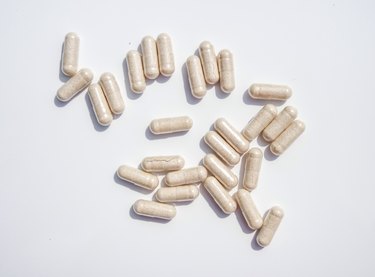
Manufacturers claim that ACV pills suppress appetite and burn fat, among other benefits. These supplements are also marketed for their ability to cleanse the liver and reduce blood sugar. Unfortunately, just like apple cider vinegar, they have modest effects on body weight.
Tip
Most health claims related to ACV pills are based on anecdotal evidence; these supplements are not regulated by the FDA and may contain harmful ingredients. Apple cider vinegar carries potential risks too, but it's less likely to cause side effects when used for cooking.
Video of the Day
ACV Tablets Versus Liquid ACV
Apple cider vinegar has emerged as a functional beverage with antioxidant and anti-diabetes effects. This fermented drink is made from crushed apples and boasts high levels of acetic acid and lactic acid bacteria along with small doses of minerals. A typical dosage is 1 or 2 teaspoons (5 to 10 grams) per day, according to Harvard Health.
Video of the Day
A review published in the Journal of Food Science in May 2014 states that ACV is rich in catechins, caffeic acid, chlorogenic acid and other bioactive compounds. Acetic acid, one of its most abundant nutrients, may inhibit the absorption of complex carbs and reduce blood sugar levels. Some studies suggest that it may also improve insulin sensitivity in people with diabetes and pre-diabetes.
This functional food is also available in supplement form. ACV pills are a concentrated form of apple cider vinegar. Their composition and nutritional value may vary from one brand to the next.
GNC Superfoods Apple Cider Vinegar, for instance, provides 600 milligrams of ACV per serving. It also contains garcinia cambogia, ginger and cayenne pepper, which are supposed to aid in weight loss. The ACV tablets from Natural Factors boast 500 milligrams of ACV per serving. Manufacturers typically recommend two or three servings per day.
Read more: Can You Lose Weight Drinking Apple Cider Vinegar?
According to an April 2016 review published in Current Opinion in Food Science, the consumption of 15 milligrams of vinegar containing 750 milligrams of acetic acid may protect against obesity, high blood pressure, elevated blood lipids and other disorders. However, the studies cited in this research paper involved liquid vinegar, not pills. In fact, there is no evidence to confirm the safety and efficacy of ACV tablets.
Do ACV Pills Work?
Most studies conducted on apple cider vinegar are either small or inconclusive. In general, they involved animal subjects, so it's unclear how their findings apply to humans.
For example, a small clinical study published in the Journal of Diabetes Research in April 2015 assessed the effects of vinegar on glycemic control. Subjects with diabetes who took 30 milligrams of vinegar containing 6 percent acetic acid before a meal experienced a greater reduction in blood sugar, insulin and triglyceride levels compared to the placebo group. These effects were attributed to vinegar's ability to increase glucose uptake.
Read more: 9 Tips for Dining Out With Type 2 Diabetes
Another study, which was featured in Scientific Reports in January 2018, suggests that apple cider vinegar has strong antimicrobial effects. It appears to be particularly effective against Escherichia coli, Candida albicans and Staphylococcus aureus. However, the study has been conducted in vitro (a controlled lab environment), so human trials are needed to confirm its results.
These studies — and others — have analyzed the properties of liquid apple cider vinegar, but none of them has mentioned ACV pills or dietary supplements containing this compound.
The experts at Penn Medicine state that there is no evidence to confirm that ACV tablets facilitate weight loss. Additionally, it's hard to tell what's inside the bottle because dietary supplements are not regulated by the Food and Drug Administration.
What About Their Side Effects?
Many dieters assume that apple cider vinegar is perfectly safe since it's all-natural. Unfortunately, this isn't the case. There's a reason why Harvard Health and other health professionals recommend no more than 2 teaspoons of ACV per day.
A case report featured in the August 2019 edition of Clinical Endoscopy highlights the potential dangers of vinegar. When consumed regularly, this fermented beverage may cause damage to the gastric mucosa, gastrointestinal tract and esophagus. Over the past years, there have been several cases of oral and esophageal injuries related to vinegar products. Like other caustic substances, this beverage may cause acidic burns and ulcers.
Apple cider vinegar may also lead to hypoglycemia, especially in people with diabetes. As mentioned earlier, this beverage may reduce blood sugar levels. When you're on a low-carb diet or fasting, your blood glucose levels drop. If you drink vinegar or take ACV pills, your blood sugar may decrease even further.
The safety of ACV tablets is unknown. Multi-ingredient formulas may pose greater risks. However, liquid apple cider vinegar is unlikely to cause adverse effects when used for cooking. Add it to salads and homemade meals for extra flavor, but don't rely on it for weight loss. There are safer, more effective ways to reach a healthy weight and keep the pounds off.
- Microorganisms: "Microorganisms in Fermented Apple Beverages: Current Knowledge and Future Directions"
- Harvard Health: "Apple Cider Vinegar Diet: Does It Really Work?"
- Journal of Food Science: "Functional Properties of Vinegar"
- GNC: "GNC Superfoods Apple Cider Vinegar"
- Vitamin Shoppe: "Apple Cider Vinegar - Easy to Swallow"
- Current Opinion in Food Science: "Therapeutic Effects of Vinegar: A Review"
- Journal of Diabetes Research: "Vinegar Consumption Increases Insulin-Stimulated Glucose Uptake by the Forearm Muscle in Humans With Type 2 Diabetes"
- Scientific Reports: "Antimicrobial Activity of Apple Cider Vinegar Against Escherichia coli, Staphylococcus aureus and Candida albicans: Downregulating Cytokine and Microbial Protein Expression"
- Penn Medicine: "Does Apple Cider Vinegar Help You Lose Weight?"
- Food and Drug Administration: "What You Need to Know About Dietary Supplements"
- Clinical Endoscopy: "Corrosive Esophageal Injury Due to a Commercial Vinegar Beverage in an Adolescent"
- Mayo Clinic: "Hypoglycemia"
- USDA: "Nutrition Facts for Apple Cider Vinegar"